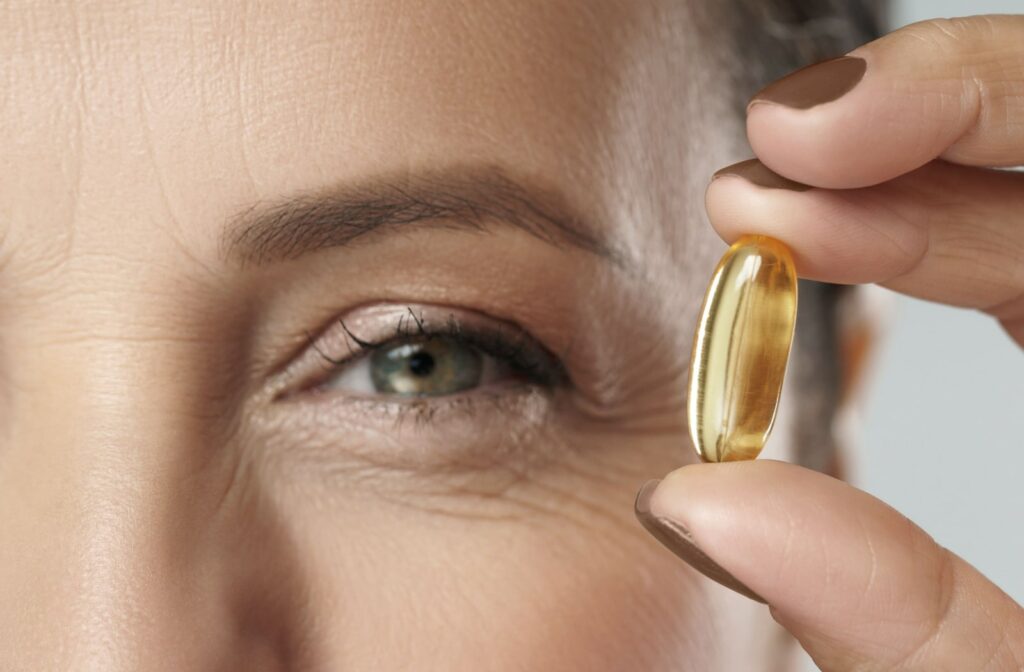Dry eyes can be a nagging and uncomfortable eye condition, leading to scratchy eyes, irritation, and difficulty seeing clearly. The issue arises when the eyes produce insufficient tears or when the tears evaporate too quickly.
Because dry eyes can result from various factors, including age, environmental factors, or certain medical conditions, your eye doctor can determine the underlying cause of your dry eyes with an eye exam before recommending treatment methods.
Among in-office treatments, your eye doctor may suggest omega-3 fatty acids and vitamins A, D, and C to help reduce symptoms of dry eyes.
What Is Dry Eye?
Dry eye is a condition that occurs when your eyes don’t produce tears as they should. It results from insufficient or poor-quality tears, lacking a component such as water, oil, or mucus. An unbalanced tear film can cause tears to evaporate more quickly, leaving the eyes dry and more susceptible to symptoms.
Symptoms of dry eye can include the following:
- A scratchy or gritty feeling in your eye
- A stinging or burning sensation
- Red eyes
- Sensitivity to light
- Blurry vision
Several underlying factors can contribute to dry eyes, including:
- Age
- Medication
- Environmental factors
- Medical conditions
- Laser eye surgery
- Prolonged screen usage
Treatment for dry eyes can include the following in-office therapies once your eye doctor determines the underlying cause of your dry eyes:
- LipiFlow is a quick procedure that uses warmth to gently massage the oil glands in the eyelid to help the oils flow more easily, thus contributing to healthy, balanced tears.
- BlephEx is an eyelid hygiene treatment that takes only a few minutes and gently cleans and exfoliates the eyelids to remove bacteria and debris that can contribute to dry eye symptoms.
Omega-3 Fatty Acids to Manage Dry Eye Symptoms
Your body cannot produce omega-3s, so you need to get them from your diet.. A diet high in omega-3 fatty acids can help protect the heart, brain, and eyes.
Omega-3s are found abundantly in fatty fish like salmon, sardines, herring, mackerel, tuna, and trout and in non-fish sources such as nuts and seeds (like flax seeds). Research has shown that people who take omega-3 supplements have fewer dry eye symptoms.
Omega-3s contribute to the production of the oily layer of tears in our eyes, which prevents the water content of the tears from evaporating, reducing the symptoms of dry eyes. Omega-3s can also help with inflammation of the eyelids, which can affect tear production.

Vitamins to Manage Dry Eye Symptoms
While research is ongoing, several vitamins can make a difference to dry eyes. Speak to your eye doctor about what vitamins can help relieve dry eye symptoms.
Vitamin A
Known for its role in maintaining healthy vision, vitamin A is a key player in the fight against dry eyes. There is a link between vitamin A deficiency and dry eye.
Vitamin A helps produce tears to lubricate the eyes and provide a smooth surface. Foods rich in vitamin A include carrots, sweet potatoes, and spinach. Vitamin A supplements are an option, however, excessive vitamin A intake can have adverse effects. Consult your eye doctor to determine the right amount for your individual needs.
Vitamin D
Vitamin D is a fat-soluble vitamin that your skin makes from sun exposure. You can also get vitamin D from a supplement.
Symptoms of vitamin D deficiency can include dry eyes and impaired tear function. Vitamin D improves the coating of tears on the eye’s surface and helps reduce inflammation. Speak to your eye doctor about your recommended daily vitamin D dosage.
Vitamin C
Vitamin C is celebrated for its immune-boosting properties, but did you know it also contributes to ocular health? Acting as a powerful antioxidant, vitamin C helps protect the blood vessels in your eyes. Patients with vitamin C deficiency can present with dry eyes.
Citrus fruits, strawberries, bell peppers, and tomatoes are excellent sources of vitamin C. Including these in your diet not only supports your overall health but also provides a shield against the discomfort of dry eyes.
Dry Eye Symptom Relief
Dry eyes can cause vision discomfort and affect quality of life. For most people, dry eye therapies can help treat causes of dry eyes and ease symptoms to improve overall eye health.
Omega-3s, vitamin A, vitamin D, and vitamin C are some examples of vitamins and supplements that can help prevent and alleviate dry eyes. Before taking any supplements, speak to the dry eye experts at Precision Eye Care for dosage recommendations based on your needs.
You can also take a proactive approach by booking an appointment to monitor your eye health and vision.





